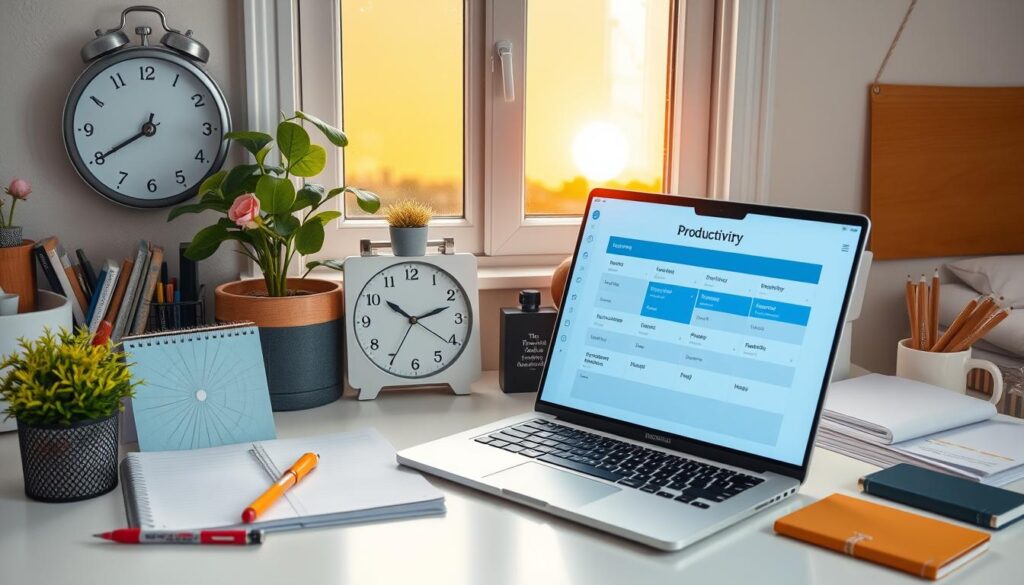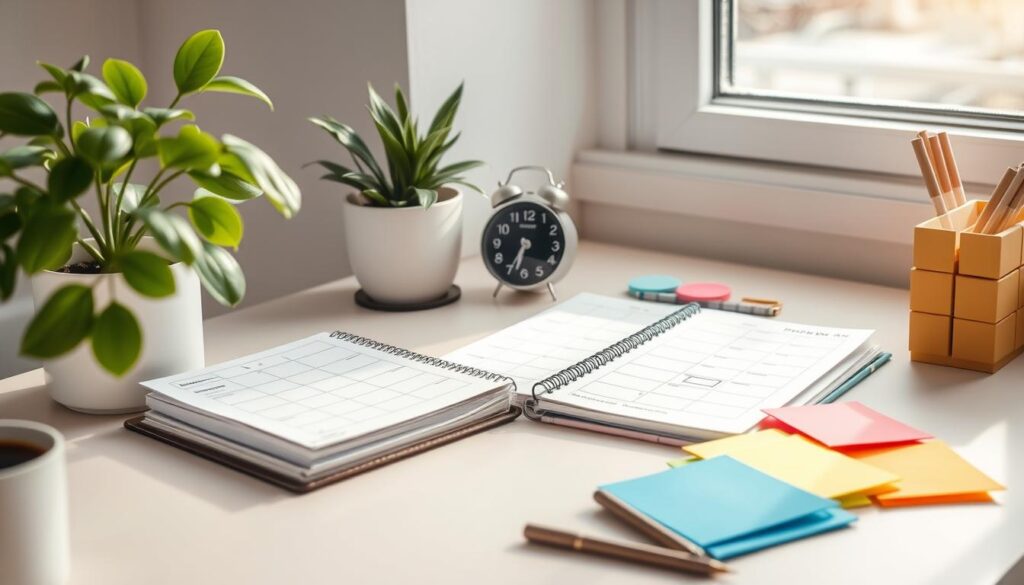In today’s fast-paced work environment, staying focused can often feel like a daunting challenge. With constant distractions vying for our attention, from buzzing smartphones to the lure of social media, maintaining concentration can seem almost impossible. However, mastering the art of focus not only enhances productivity but also contributes to overall job satisfaction and efficiency. In this article, we’ll explore practical tips for staying focused at work, empowering you with effective strategies for staying on task at work. Whether you find yourself frequently losing concentration or simply seeking to sharpen your focus, these concentration techniques will help you regain control and elevate your work performance. Let’s dive in and discover how you can transform your workday into a more focused and fulfilling experience.
In today’s fast-paced work environment, staying focused is key. It’s hard to concentrate with all the digital distractions and constant info. This article is a guide on how to stay focused at work. It offers effective tips to boost your concentration and efficiency.
Statistics show that 83% of people improve their focus and productivity by setting clear goals at the start of their day. Also, employees who follow structured routines see a 60% increase in staying engaged during busy times. You’ll learn practical tips for staying focused, like the Pomodoro Technique, effective time management, and keeping a clean workspace.
Key Takeaways
- Setting clear goals enhances focus and productivity.
- A structured routine significantly boosts engagement levels.
- Effective time management techniques like the Pomodoro Technique can increase task completion.
- A decluttered workspace reduces distractions and improves concentration.
- Regular breaks are essential for maintaining cognitive function and creativity.
- Practicing mindfulness and meditation can lead to enhanced focus and reduced stress.
Understanding the Importance of Focus at Work
Focus is key to reaching your full potential at work. It helps you focus better and do your job well. Studies show that distractions can make you lose a lot of time.
Things like stress, messy spaces, and trying to do too much at once can distract you. A messy desk can make your mind feel cluttered too.
In today’s world, distractions can really affect how happy you are at work. Many people feel they can’t focus because of distractions. But, using good time management can help you stay focused.
Try the Pomodoro Technique for better focus. It’s 25 minutes of work followed by a short break. Mindfulness, like yoga, also helps your brain stay sharp. Eating well, exercising, and sleeping enough are also important for staying focused.
Focus is very important for your job success. Understanding its value can help you reach your goals at work.
Identifying Common Distractions
It’s key to know what distracts you at work. This is true whether you’re in an office or working from home. Many things can interrupt your focus. Here are some common ones:
- Email alerts and notifications
- Social media updates
- Frequent meetings
- Chatty coworkers
- Ambient noise
- Multitasking
- Procrastination
- Personal errands
- Cluttered workspaces
- Lack of clear goals
Studies show it can take up to 23 minutes and 15 seconds to get back on track after a distraction. Knowing what distracts you is important. It affects how well you work and your overall performance.
54% of workers say distractions stop them from doing their best. And 50% feel less productive because of these interruptions.
To fight distractions, you need good strategies. This means setting clear limits, staying focused, and having a clean workspace. By tackling distractions, you can work better and be more productive.
How to Stay Focused at Work: Key Strategies
Staying focused at work is key to being more productive and reaching your career goals. Using the right strategies can help you tackle daily tasks better. Here are important steps to improve your concentration at work.
Setting Clear and Achievable Goals
Clear goals are the base for staying focused at work. Using the SMART framework helps make vague dreams into real goals. This method gives you direction and motivates you to do tasks well.
Prioritizing Tasks Effectively
It’s important to prioritize tasks to tackle the most urgent ones first. The Eisenhower Matrix helps sort tasks by urgency and importance. This way, you focus on key tasks, saving time and boosting productivity.
Creating a Structured Daily Routine
A daily routine is key to enhancing work productivity and focus. By setting time for tasks, you can make your work flow better. Start with a morning routine that boosts your energy and sets a good day tone.
Doing things like exercise, meditation, or reading can really help. It makes you more productive and happy.
It’s also important to take regular breaks. The Pomodoro Technique is a good way to work in focused 25-minute blocks. Then, take a 5-minute break. This keeps you focused and gives you time to rest.
Here are some tips for a work routine for focus:
- Set specific learning goals to grow continuously.
- Use a calendar to manage meetings and tasks well.
- Get enough sleep, 7 to 9 hours, to stay focused and energetic.
- Do physical activities in the late afternoon when you’re most coordinated.

A clear daily plan helps you stay productive. It balances work, rest, and learning. This creates the best environment for reaching your goals and being your best self.
| Time Block | Activity | Purpose |
|---|---|---|
| 6:00 AM – 7:00 AM | Morning Rituals | Boost energy and productivity |
| 9:00 AM – 12:00 PM | Focused Work | Complete high-priority tasks |
| 12:00 PM – 1:00 PM | Lunch Break | Recharge and prevent burnout |
| 1:00 PM – 4:00 PM | Afternoon Tasks | Utilize peak performance hours |
| 4:00 PM – 4:15 PM | Short Break | Refresh focus and energy |
| 4:15 PM – 5:00 PM | Wrap Up | Review day’s progress and set goals for tomorrow |
Eliminating or Reducing Distractions
Distractions at work can really slow you down. To stay focused, it’s key to cut down on distractions. This means making your work area calm and setting clear rules for work.
Creating a Calm Work Environment
Keeping your workspace tidy is a good start. It helps you avoid getting sidetracked. Also, tell your coworkers when you’re busy and ask them to not disturb you.
Studies show phones are a big problem at work. They can really hurt your productivity. To focus better, try using headphones or soft music in the background.
Using Technology to Your Advantage
Technology can be both a blessing and a curse at work. Use apps to block sites that distract you and control your notifications. This way, you can avoid getting sidetracked by social media or emails.
It takes a lot of time to get back to what you were doing after being interrupted. So, it’s smart to use tech to help you stay on track. This way, you can turn distractions into tools that help you achieve your goals.
| Type of Distraction | % of Workers Affected |
|---|---|
| Personal calls, texts, and emails | 24% |
| Distracted by office noise | Variable |
| Social media notifications | Variable |
| Emails | Top distraction |
| Mobile phone use | Over 50% |
Implementing Time Management Techniques
Using good time management can really help you work better and stay focused. The Pomodoro Technique and time blocking are two great ways to do this. They help you stay on track and avoid getting too tired by breaking tasks into smaller parts.
Utilizing the Pomodoro Technique
The Pomodoro Technique means working in short, focused times—usually 25 minutes. Then, you take a five-minute break. This helps you stay away from distractions and work better. Each “Pomodoro” adds to your focused time, helping you get things done. It also makes work feel better and less stressful.
Embracing Time Blocking
Time blocking is another smart way to work better. It means setting times for certain tasks, so you only do one thing at a time. This helps you focus on what’s most important first. For example, the Eisenhower Matrix can sort tasks into four groups. Doing the most important ones first makes your day more efficient.

| Technique | Structure | Benefits |
|---|---|---|
| Pomodoro Technique | Work for 25 minutes, break for 5 minutes | Improves concentration, reduces fatigue |
| Time Blocking | Set periods for specific tasks | Enhances task prioritization, minimizes multitasking |
Adding these time management methods to your day can really boost your productivity. It makes it easier to avoid putting things off and helps you stay focused. This way, you can reach your work goals more easily.
The Benefits of a Decluttered Workspace
A clean workspace helps you work better and stay focused. It lets you focus on important tasks without looking for lost things. This saves you a lot of time.
Clutter can distract you and make it hard to stay focused. A tidy workspace helps you think clearly and make decisions faster. This makes it easier to get your work done.
A tidy workspace also makes you less stressed and anxious. It’s easier to find what you need, which avoids frustration. This lets you stay motivated and tackle meaningful tasks without getting bogged down by mess.
- Cleaning surfaces makes your work area healthier and reduces sickness.
- Decluttering shared spaces helps everyone find what they need.
- Working together to clean up encourages a team effort.
Offering rewards for a clean workspace can get everyone involved. Training on organizing digital and physical files promotes a clean work environment. Using professional moving and storage services can help companies declutter and improve well-being.
Keeping your workspace organized regularly boosts your focus and productivity. Reviewing and updating your work area helps you work more efficiently. This lets you excel in your job.
Practicing Mindfulness for Enhanced Focus
Practicing mindfulness is key for better concentration and productivity at work. Up to 26% of workers face stress at work. Mindfulness can help manage this stress and improve focus.
Mindfulness, like meditation, helps reduce distractions. Just 10 to 20 minutes a day can improve your focus and mental clarity. It also makes you better at tasks, reduces mistakes, and helps make decisions without bias.
Practicing mindfulness with coworkers can also boost team focus and unity. It makes you more empathetic and communicative, improving work relationships. Studies show it makes you stronger against stress and challenges.
- Improves focus and attention span
- Enhances social relationships through empathy
- Promotes better decision-making
- Builds resilience against stress
Adding mindfulness to your daily routine can change your work space. It creates a culture of focus and support. Shared mindfulness experiences make your workplace more engaged, productive, and harmonious.
Taking Regular Breaks for Productivity
Adding regular breaks to your work is key for top performance. The science of productivity proves breaks reduce stress, boost creativity, and sharpen focus. Taking breaks the right way helps you recharge, leading to better work and mental health.
The Science Behind Breaks
Many studies show the benefits of taking breaks. Short breaks improve memory and brain function. Doing something different, like stretching or walking, helps keep your mind sharp.
But, using breaks to scroll social media can harm your mood and control. Good breaks should make you feel good inside. The Pomodoro method, with 25 minutes of work and 5 minutes off, keeps you productive without getting tired.
Make your breaks your own by trying different things. Seeing how others take breaks can also help. It creates a supportive work space when everyone takes breaks together.
Limiting Multitasking to Boost Concentration
In today’s world, it’s hard to stay focused. But, doing one thing at a time helps a lot. This way, you can really dive into your work and get better at focusing.
Feeling tired, bored, or overwhelmed can make it hard to focus. Here are some tips to help:
- Create distraction-free zones in your workspace.
- Practice time blocking to allocate specific periods for work tasks.
- Make lists to help prioritize and stay organized.
- Set reasonable expectations for what you can accomplish in a day.
- Reduce notifications from your phone and computer.
- Leverage calendars to plan and remind yourself of important tasks.
- Use focus tools or time-management apps, like the Pomodoro technique, to enhance workflow.
- Invest in ergonomic office furniture to improve comfort and diminish fatigue.
- Create playlists designed specifically for focus time.
- Ensure you are taking regular breaks to maintain mental clarity.
- Stop engaging in multitasking during work hours.
- Prioritize getting adequate sleep each night for more effective concentration.
Setting boundaries is key to staying focused. Try to cut down on messages, check social media less, and avoid shopping online while working. In shared spaces, using visual barriers can help too.
Improving your environment can also help. Adding plants can make your office happier and cleaner. Studies show that mindfulness training can also improve your focus.
By using these tips, you can get better at focusing. This will help you do deeper work and be more productive. Cutting down on multitasking not only improves your focus but also makes your work and life better.
Adopting Healthy Lifestyle Habits
Living a healthy lifestyle helps you stay focused at work. What you eat affects your brain and how you feel. Eating well can give you more energy and help you concentrate better.
Changing your diet a little can make a big difference. It can help you work better.
The Impact of Nutrition on Focus
Good nutrition is key for staying sharp. Foods with omega-3s, antioxidants, and vitamins are good for your brain. They help you stay clear-minded.
Eating foods that are good for your brain can stop you from feeling tired. This keeps you productive all day.
- Fruits and Vegetables: They have vitamins and minerals that keep your brain working well.
- Whole Grains: They give you energy to stay focused and concentrated.
- Lean Proteins: They help make neurotransmitters, which are important for your brain.
- Healthy Fats: In fish, nuts, and avocados, they help your brain stay healthy.
Also, being active is part of a healthy lifestyle. Exercise makes you feel good and helps you focus. Eating right and staying active create a great work environment.
Strategies for Better Focus in Meetings
Good meetings need careful planning to keep everyone focused. Start with clear goals. Make an agenda to keep talks on track. Keep meetings short to avoid tiredness and keep ideas flowing.
Using meeting strategies for concentration makes meetings better. Track how long meetings last to plan better for next time. Eating before meetings helps your brain work better. Light exercise before meetings boosts your focus.
It’s important to avoid distractions. Fewer screens and devices mean less interruption. Taking notes keeps you engaged and helps you remember important points.
For those with neurodivergent conditions, small fidget items help in virtual meetings. In-person meetings might use gum for those with ADHD or autism. Even simple things like ice cubes in water can keep you alert.
Being positive is key to better meetings. When you’re motivated, you contribute more. These tips help make meetings effective, keeping everyone focused and working together.
Seeking Accountability for Your Productivity
Accountability boosts your chances of reaching your goals. Sharing your goals and progress with colleagues or supervisors creates a supportive atmosphere. This helps you stay focused and committed. Here are some ways to boost accountability:
- Set SMART goals to ensure clarity and achieve effective outcomes.
- Take 30 minutes each week for self-reflection to check your progress and adjust your plans.
- Use at least two types of accountability systems to keep you motivated and on track.
- Celebrate small wins to keep your motivation high.
Using digital tools like Notion for tracking accountability makes it easier and more engaging. This builds a culture of improving work focus through support. It makes sure everyone knows their role, reducing confusion and boosting respect.
Being open in communication is key. Avoiding secret meetings helps build trust and accountability. Regular feedback is important. It makes employees feel valued and responsible, not scared.
Remember, not having the right training can hurt accountability. Find out where skills are lacking and offer training. Leaders should show the way by being accountable themselves.
Reflecting and Adjusting Your Focus Strategies
Thinking about how you stay focused at work is key to being productive. Being flexible with your focus strategies helps a lot. It lets you find what works best for you, leading to better results.
Adding continuous improvement to your routine helps you get better at staying focused. Many struggle with focus because work changes a lot. For example, over 92% of people multitask in meetings, making them less effective.
When adjusting your focus strategies, use tools that help you reflect and improve your habits. Apps like Daylio track your mood, and Lumosity boosts your mental fitness. The Freedom app blocks distractions, helping you focus better. Using these tools can help you manage your time and see how your productivity changes.
Try using focused work periods, like 50-minute sprints with breaks. This method helps you stay focused and gives you rewards. It also lets you reflect on what works best for you. Notice how small changes affect your productivity and stress.

| Focus Strategy | Tool/Approach | Benefits |
|---|---|---|
| Adjusting focus strategies | Daylio app | Tracks mood and identifies triggers |
| Continuous improvement approaches | Lumosity app | Enhances mental fitness |
| Blocking distractions | Freedom app | Improves concentration |
| Structured work phases | 50-minute sprints | Boosts productivity and focus |
By balancing these strategies and reflecting often, you get valuable insights. This helps you adapt and work better, even with distractions. The goal is to do productive work that helps you grow personally and professionally.
Resolving to Stay Motivated at Work
Staying motivated at work is key to being productive and focused. You can do this by setting personal goals and celebrating your wins. A good work environment makes everyone feel better and more motivated.
Having a plan helps you know how to reach your goals. It shows what you need and what might get in your way. Making a schedule helps you focus by setting aside time just for work. Here are some ways to stay motivated at work:
- Set clear and achievable goals that provide direction.
- Take regular breaks to recharge and prevent burnout.
- Recognize and celebrate your achievements to maintain enthusiasm.
- Create a motivating work environment that promotes collaboration.
- Deal with distractions promptly to maintain productivity.
Knowing why staying motivated is important helps you do better at your job. When you work on staying motivated, you get better at focusing, working well, and moving up in your career.
| Focus Strategies | Impact on Motivation |
|---|---|
| Setting Goals | Provides purpose and clarity |
| Taking Breaks | Prevents burnout and enhances attention |
| Recognizing Achievements | Boosts self-confidence and personal satisfaction |
| Providing Feedback | Encourages continuous growth and improvement |
| Creating a Supportive Network | Promotes collaboration and shared success |
By using these strategies, you set yourself up for success. Make staying motivated a top goal. You’ll see big improvements in how well you work and how happy you are at your job.
Conclusion
This article talks about how to stay focused at work. Many people struggle with distractions, with 86% of professionals facing this issue. To get better, start by noticing what distracts you.
Creating routines, setting priorities, and being mindful can help a lot. These steps can make you more productive and less affected by distractions.
Using the Pomodoro technique and taking breaks can improve your focus and mental health. Setting goals also keeps you motivated. These habits help you stay focused for longer.
Keeping motivated at work is an ongoing effort. It’s important to adapt to distractions and keep improving your work habits. By managing your time well and creating a good work environment, you can focus better. This leads to more productivity and a happier work life.
